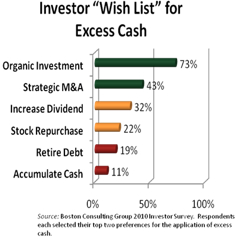Strategic Alternatives for Cash
According to recent data out of the Federal Reserve, corporate America is carrying record levels of cash. As of March, non-financial companies held 7% of their assets in cash and other liquid investments, up 26% from 2009 and the highest level recorded in nearly fifty years. On the face, this makes sense. The financial crisis of 2008 clearly caused many companies to elect to retain higher than normal cash balances in an attempt to preserve much-needed financial flexibility. It is likely that many companies are holding cash not only due to the many uncertainties that plague the current economic environment (a weak consumer, a likely increase in corporate taxes, and a possible double-dip recession), but also to fuel the next wave of mergers and acquisitions.
While the Fed’s measurement of cash is somewhat limited, a similar theme is noted when analyzing our clients and their competitors in our Value Creation Framework. Cash as a percentage of invested capital (which includes capitalized R&D expense and off-balance sheet leases) is very high versus historical measures. Clearly, with an uncertain economic outlook and the lessons of the financial crisis at the front of the collective minds of management, cash balances are high and are likely to stay at elevated rates into the foreseeable future.
What do investors want companies to do with their cash?
 So what should companies do with their bulging wallets? According to a recent survey by the Boston Consulting Group, the vast majority of institutional investors would like to see corporate America invest in organic growth, followed by strategic M&A. To no surprise, investors have the right idea: both of these courses of action could clearly create value if investments in existing or acquisitive ventures achieve rates of return higher than a firm’s cost of capital. Growth, whether organic or acquisitive, fuels earnings growth which can be increasingly hard to generate as companies mature and the economy remains soft.
So what should companies do with their bulging wallets? According to a recent survey by the Boston Consulting Group, the vast majority of institutional investors would like to see corporate America invest in organic growth, followed by strategic M&A. To no surprise, investors have the right idea: both of these courses of action could clearly create value if investments in existing or acquisitive ventures achieve rates of return higher than a firm’s cost of capital. Growth, whether organic or acquisitive, fuels earnings growth which can be increasingly hard to generate as companies mature and the economy remains soft.
Next on investors’ pecking order are strategic options that are value-neutral to an individual firm: an increase in dividends and share repurchase. From a “structural finance” perspective, distributions to shareholders in the form of dividends or share repurchases are value-neutral: they decrease the enterprise value of the firm as a result of the declining cash balance, but this loss of value is fully offset by the increase in a company’s share price post-distribution.
On a macroeconomic level, however, we believe that such distributions can be value-creating. Excess cash distributed to investors in the form of higher dividends or share repurchase can be reinvested by investors into firms that earn ROIC’s above their cost of capital.
Think of it this way: value can be created in the capital markets when firms with “too much cash for their own good” return their cash to investors. Rather than earn a minimal rate of return in a company’s bank account, this cash can then be invested elsewhere in the capital markets (say, into firms with management teams that can invest that cash into ventures that earn high returns on capital).
Last on the wish list of institutional investors is the strategic option to continue to build cash on the balance sheet. Clearly, this option is less than ideal: cash balances almost always earn a return less than a firm’s cost of capital. At some point, high cash balances that earn a minimal rate of return on a time deposit is a value-destructive use of cash when a firm’s cost of capital is significantly higher.
Why R&D may be a Firm’s Best Alternative
Firms with high cash balances should ideally reinvest in their businesses, either organically or through M&A. In addition to those options, we argue that a particularly prudent use of cash balances is to invest in new research & development endeavors.
At bridgesphere, we view R&D as an asset, not an expense. Unlike the world of GAAP accounting, we believe that R&D is a current-period investment, intended to generate cash flows long into the future. Consequently, firms keenly focused on value creation should identify R&D projects with potential returns above their cost of capital and invest heavily. In our opinion, innovative, cash-rich companies should invest without fear. Why earn almost 0% on your cash, when a business spawned by R&D investment could give rise to a high-return business?
In fact, given the uncertain economic environment, R&D investments are even more timely, for their potential revenues are likely to come when the economic recovery has already materialized. Thus, the fruits of current R&D expenditures will be more closely matched to the time in which the consumer is once again healthy and capital spending is robust. To us, that is an ideal formula for value creation: using excess cash in an uncertain economic environment to invest in projects that will pay-off when the economy is booming.
Turning to the macro picture, we believe that strategic investments in R&D would have a beneficial impact on the larger economy. Typically, increases in R&D are associated with a new wave of hiring: a potential source of new jobs in a stalled-out employment market. On a similar note, the current state of the employment market suggests that these new hires are incrementally cheaper than they were several years ago: a financial benefit to the firm, making new R&D ventures a win-win for corporate America and the larger economy.
While we acknowledge that a marked increase in R&D expenditures would create a near-term drag on earnings, prudent R&D investment would signal to shareholders that companies have the wherewithal to apply the excess cash accumulated during the worst of the economic downturn and invest in the future. Such investments are perhaps the best alternative for excess cash that currently plagues balance sheets, frustrates investors, and creates a drag on the larger economy.
Boost profit & growth with Business Performance Planning
Click to learn more!
Management Consulting
Click here for more about management consulting & read a collection of our recent case studies

Own it.
Whenever someone says they want to “manage” something, I cringe.
I immediately ask myself, is there a better word? After all, words matter. The words we chose carry deep significance, not just because of their inherent meaning, but because they give insight into our actions. They cast light on our motivations.
So when people tell me they’re going to manage something (or even worse, manage-through something), I immediately try and discern whether they’re setting themselves up for failure.
After all, ownership breeds success. Management reeks of passivity.
read more
Why you can’t lose those 10 pounds – And why Oprah should run for President
Americans are obsessed with weight loss.
Our culture is fixated on it. Everywhere you turn you see diet books, commercials for weight loss products. There are entire television series devoted to it. It seems like everyone at Trader Joe’s is infatuated with kale.
Even Weight Watchers can’t seem to go wrong. Call it the Oprah effect.
read moreManagement Consulting
Click here for more about management consulting & read a collection of our recent case studies
Business Performance Planning
Take your business to the next level. Boost profit & growth with a game plan used by multinational corporations
Research & Insights
Our latest thinking on business strategy, financial strategy, as well as a collection of our latest case studies
About Bridgesphere
Learn more about Bridgesphere, its founder, and how we help clients solve their most complex problems

